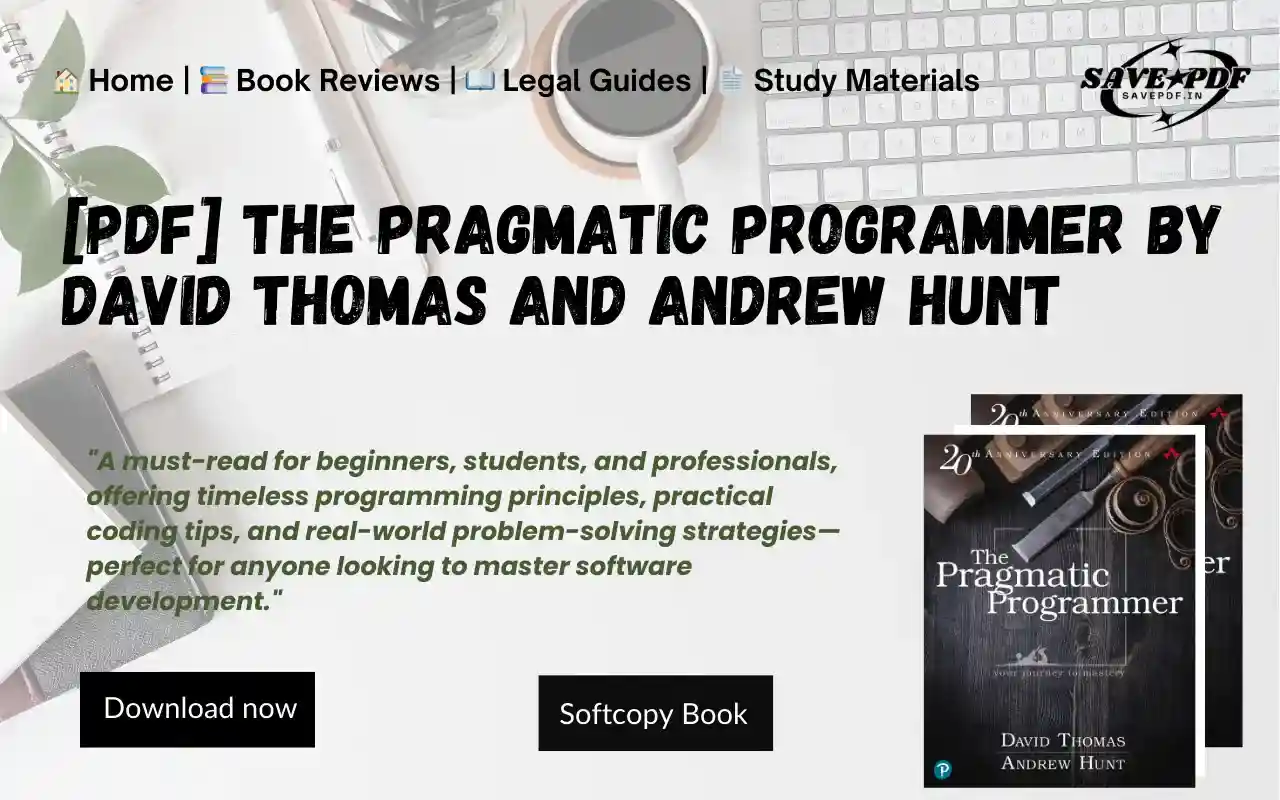Introduction
Are you looking for The Pragmatic Programmer PDF GitHub free download? Whether you’re a beginner, a professional developer, or a software enthusiast, The Pragmatic Programmer by David Thomas and Andrew Hunt is a must-read. This book has influenced generations of programmers by providing invaluable insights into best coding practices, debugging, testing, and software craftsmanship.
This guide will summarize key lessons from the book, explore its table of contents, and help you find the best sources for The Pragmatic Programmer 20th Anniversary Edition GitHub download.
Why You Should Read The Pragmatic Programmer
This book isn’t just about coding—it’s about developing a pragmatic mindset that helps you become a better problem solver, communicator, and developer.
Key Benefits:
✔️ Enhances software development skills
✔️ Promotes best coding practices (similar to Clean Code PDF GitHub)
✔️ Covers debugging, automation, and team collaboration
✔️ Helps developers think critically about software design
✔️ Encourages lifelong learning
All Exam Books PDF: Click Here
Table of Contents Overview
The book is structured into eight major chapters, each covering critical programming principles. Here’s a breakdown of the most important topics:
Chapter 1: A Pragmatic Philosophy
🔹 The Cat Ate My Source Code – Taking responsibility for your work.
🔹 Software Entropy – Avoiding messy, unmaintainable code.
🔹 Stone Soup and Boiled Frogs – Small changes lead to big improvements.
🔹 Good Enough Software – Writing practical, not perfect, code.
🔹 Your Knowledge Portfolio – Continuous learning as a programmer.
🔹 Communicate! – Essential soft skills for developers.
Chapter 2: A Pragmatic Approach
🔹 The Evils of Duplication – Following the Don’t Repeat Yourself (DRY) principle.
🔹 Orthogonality – Independent code modules for better flexibility.
🔹 Reversibility – Writing adaptable code.
🔹 Tracer Bullets – Testing solutions incrementally.
🔹 Prototypes and Post-it Notes – Experimenting before committing.
🔹 Domain Languages – Writing code that speaks your business logic.
🔹 Estimating – Making accurate project predictions.
Chapter 3: The Basic Tools
🔹 The Power of Plain Text – Keeping code human-readable.
🔹 Shell Games – Mastering command-line tools.
🔹 Power Editing – Efficient coding techniques.
🔹 Source Code Control – Version control best practices.
🔹 Debugging – Systematic troubleshooting.
🔹 Text Manipulation – Automating repetitive coding tasks.
🔹 Code Generators – Avoiding repetitive code writing.
Chapter 4: A Pragmatic Paranoia
🔹 Design by Contract – Writing reliable software.
🔹 Dead Programs Tell No Lies – Let failing code fail fast.
🔹 Assertive Programming – Using assertions to catch bugs.
🔹 When to Use Exceptions – Handling errors correctly.
🔹 How to Balance Resources – Managing memory and CPU efficiently.
Chapter 5: Bend or Break
🔹 Decoupling and the Law of Demeter – Writing loosely coupled code.
🔹 Metaprogramming – Writing code that writes code.
🔹 Temporal Coupling – Avoiding dependency on execution order.
🔹 It’s Just a View – Separating UI from logic.
🔹 Blackboards – Handling complex data sharing.
Chapter 6: While You Are Coding
🔹 Program by Coincidence – Avoiding unpredictable results.
🔹 Algorithm Speed – Writing efficient code.
🔹 Refactoring – Improving existing code.
🔹 Code That’s Easy to Test – Writing test-friendly code.
🔹 Evil Wizards – Avoiding dependency on auto-generated code.
Chapter 7: Before the Project
🔹 The Requirements Pit – Gathering accurate project requirements.
🔹 Solving Impossible Puzzles – Breaking down complex problems.
🔹 Not Until You’re Ready – Starting only when you understand the task.
🔹 The Specification Trap – Avoiding overly rigid specs.
🔹 Circles and Arrows – Using diagrams wisely.
Chapter 8: Pragmatic Projects
🔹 Pragmatic Teams – Building effective development teams.
🔹 Ubiquitous Automation – Automating repetitive tasks.
🔹 Ruthless Testing – Catching errors before release.
🔹 It’s All Writing – Writing clear documentation.
🔹 Great Expectations – Setting realistic software goals.
DAILY CURRENT AFFAIRS : CLICK HARE
Where to Download The Pragmatic Programmer PDF for Free
If you’re searching for The Pragmatic Programmer PDF GitHub download, here are reliable sources:
📌 GitHub Links:
Please wait while we prepare your download…
📌 Other Sources:
Join our Telegram channels for more updates and resources:
1️⃣ ALL_Exam_Update – Get the latest exam updates and notifications. Click here
2️⃣ Save PDF – Access and download essential study materials in PDF format. Click here
Stay informed and never miss an update! 🚀📚
🔴 Important: Always download legally to respect copyright laws.
Common Mistakes Readers Make When Studying This Book
Many people read The Pragmatic Programmer but fail to fully benefit due to these mistakes:
❌ Reading Without Practicing – Apply concepts to real projects.
❌ Ignoring Software Design – Complement it with SOLID principles.
❌ Not Engaging with the Community – Join GitHub discussions, Reddit threads, and forums.
❌ Overlooking Testing and Debugging – These are essential for pragmatic programming.
Final Thoughts – Is The Pragmatic Programmer Worth Reading?
Absolutely! Whether you’re a beginner or a professional, this book will refine your problem-solving skills, enhance your coding techniques, and make you a pragmatic developer. If you’re searching for The Pragmatic Programmer audiobook free or The Pragmatic Programmer 20th Anniversary Edition GitHub, use the resources above.
🔥 Start your journey toward better programming today! 🚀

